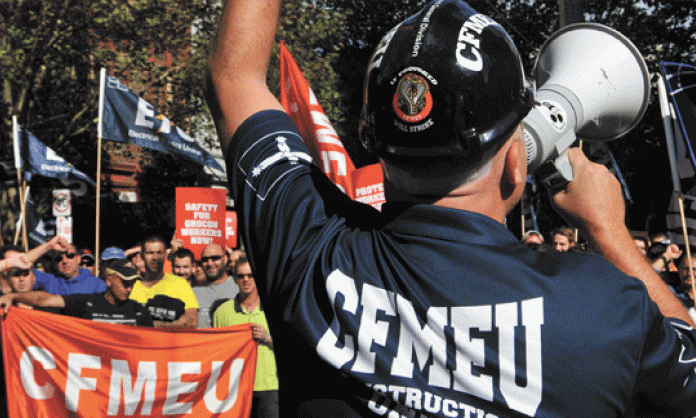15 October 2009: At the Pentridge Prison redevelopment in Melbourne’s northern suburbs, a massive concrete pump is set up. Though there have been excavations and backfillings throughout the area, no compaction tests are done on the ground.
Around 11am, one of the pump’s outriggers sinks into the mud. As the whole appliance tips, the pump’s boom hits Thomas Kelly from behind, smashing him into the freshly poured concrete slab he has been working on. He is hauled out by his workmates, but declared dead at the scene.
8 July 2014: In a full day of evidence at Tony Abbott’s Royal Commission into Trade Union Governance and Corruption, the killing of Kelly is referred to on more than a dozen occasions. The event is referred to as a “tragic accident”, a “terrible incident”, an “awful incident”, a “tragic incident” or simply as “the incident”.
Not once is the cause of Kelly’s death discussed. No one asks why such a serious failing in health and safety happened or why no one was ever prosecuted. With the union lawyer muzzled by the commission’s procedural rules, there is no mention of the fact that, because Kelly was working on a sham subcontracting arrangement, he wasn’t covered by insurance that would have meant a payout on death.
No one asks about the welfare of his wife or his two sons. No one even says his name.
A killer site: but who is on trial?
When Abbott announced this Royal Commission, he declared that it would “shine a great big spotlight into the dark corners of our community”.
Sure enough, on 8 July, property developer Leigh Chiavaroli took the stand. Leigh (and father Peter) Chiavaroli’s company West Homes is the owner and developer of the giant Pentridge Prison redevelopment. Prior to his appearance at the commission, a Google search for “Leigh Chiavaroli” indicated that his main brush with fame was his demand for $3 million in return for handing the bones of Ned Kelly over to the bushranger’s descendants, after the remains had been dug up from the Pentridge site.
But attempted profiteering from human remains is only an incidental part of the Chiavaroli’s business model. West Homes is a house builder. This is the source of Chiavaroli’s problems with the CFMEU, and the reason why he is a poster boy for Abbott’s commission.
For many decades, the vast majority of “domestic” construction has been done by small gangs of subcontractors, usually operating below the radar of the construction unions. Underpayment, shonky safety and chains of dodgy subcontractors are rife in this sector.
The problems of this method of construction are multiplied when applied to large commercial sites involving multi-storey, multi-unit construction jobs. This distinction between heavily unionised “commercial” and smaller “domestic” construction, dominated by small subcontractors, has existed for many decades.
But if you believe Leigh Chiavaroli, he can’t work out the difference. In his best “confused and concerned” tone of voice, Chiavaroli told the commission: “The query that I really had was, I couldn’t understand why I was being told it was a commercial site when I sought advice from the Master Builders [Association] and they said quite clearly it was a domestic site.”
It seems that Chiavaroli believes that an $800 million redevelopment, which includes apartment buildings of four and five stories with basement car parks, should be allowed to proceed along the same lines as some shack being built in the outer suburbs.
For the CFMEU to stay an effective union, it has had to defend its hard-won turf against the likes of Leigh Chiavaroli. The union had made efforts to get Pentridge on to a union enterprise agreement, and stepped up these efforts – in a very difficult, uphill battle – after Thomas Kelly was killed.
But it’s the union, not the company responsible for the shonky and fatal site, that’s on trial here.
A Royal Commission looks and feels like a court. We’re in the legal precinct on William Street, Melbourne. Everyone stands and nods as the commissioner, former High Court judge Dyson Heydon, enters the room and parks his arse for the morning.
I’m in for a shock. Having no special knowledge of legal procedure, I assume that, after someone like Chiavaroli has spent a good hour or so defaming the union, the union’s lawyer will get a chance to cross-examine. In fact, there is no such right.
According to Heydon’s Practice Direction Number One, cross-examination is totally at the discretion of the commissioner and his counsel assisting. Any cross-examination is never at the time of the “evidence in chief” and is restricted to contradicting matters raised in evidence.
This means that Peter and Leigh Chiavaroli will never be asked why they have failed to make good on their pledge to give financial assistance to Thomas Kelly’s family after he was killed; nor why Kelly was working in a sham subcontracting arrangement on their site; nor how many tens of thousands of dollars they have donated to the Liberal Party over the years.
And if any of the wild allegations are proved to be total fabrications at the commission, this will happen only weeks after the union has been defamed from the dock.
Tackling union power: the point of the Royal Commission
The commission in Melbourne was a farce in three parts.
Day one was about the money. One of the features of an industry super fund is that union nominees play a role in its administration, and unions play a major role in making sure employers keep up to date with their contributions. Counsel assisting the commission, Daniel Stoljar, spent the first day in an energetic (and totally unsuccessful) attempt to prove that personal information, including phone numbers, had been leaked by employees of industry superannuation fund Cbus to the NSW branch of the CFMEU.
Day two was the testimony of the Chiavaroli family about its quest to conduct an $800 million development along the lines of a two bit suburban job.
Day three, finally, got to the point: an extended lecture from one of the biggest companies in the land about the evils of union power on construction sites in Melbourne’s CBD.
A string of executives from building supplies company Boral gave evidence. They testified that the company’s difficulties with the construction union stem from the major ongoing dispute between Grocon, one of the biggest construction companies in the country, and the CFMEU.
Grocon operates its notoriously unsafe sites without union-approved shop stewards or health and safety reps. This is a major threat to the industrial position of the CFMEU, and therefore a major threat to the safety standards, wages and conditions of Melbourne construction workers (conditions which, according to one outraged author in the Financial Review earlier this year, are the best in the world for construction workers).
Boral executives allege that, in the course of this dispute, CFMEU secretary John Setka declared: “We’re at war with Grocon, and in a war you cut the supply lines.” This piece of industrial common sense infuriated Boral. CEO Mike Kane compared the union approach to “the worst excesses of racketeering-like behaviour and shady illegal enterprises”.
Boral kept supplying concrete to Grocon. At the start of 2013, the company claimed a dominant 40 percent share of the supply of concrete to major jobs in Melbourne. Eighteen months later, Boral says its market share is down to single digits and falling. Grocon, with a fast-dwindling order book, is Boral’s only major customer in the Melbourne CBD.
According to Mike Kane, in the Melbourne CBD the CFMEU “has significant control of all large construction sites except Grocon sites and no law in Australia seems to be able to stop their racketeering behaviour”.
It’s an interesting thing, the law. Thomas Kelly was killed on a construction site and, judging from the lack of prosecutions, it seems that not a single law was broken. But when the CFMEU, allegedly, takes action to preserve its position and that of its members, a version of the legal apocalypse follows.
According to counsel assisting the commission, the ever-eager commissioner and various Boral executives, the CFMEU and its officials have breached a long list of laws. These supposedly include sections 45D and 45E of the Competition and Consumer Act (formerly the Trade Practices Act), which can result in millions of dollars of fines; the relatively new “cartel” provisions of the same act, which can send someone to jail for 10 years; common law torts “such as conspiracy, intimidation and interference with contract”; and Crimes Act provisions relating to blackmail, which can carry a penalty of 15 years.
It’s an impressive list, but construction bosses face a fundamental problem. Supreme Court judges, senior Boral executives and commissioners don’t batch concrete, deliver it or pour it – that’s left to flesh and blood workers such as Thomas Kelly and the 30,000 Victorian members of the CFMEU. As one of Boral’s customers put it in a document tendered to the commission: “We may have written protection from the courts but the final power still belongs to the union.”
Stuck in this maddening situation, construction bosses and their hired flunkies have only one solution – more draconian laws and beefed-up agencies with more draconian powers to enforce them. Mike Kane sounded positively homesick for the vicious anti-union laws of the US when he testified:
“There are vehicles that are used elsewhere in the world. In the US the Racketeer Influenced and Corrupt Organizations Act is a weapon used by government to not only criminally prosecute corrupt organisations, but to seize the assets used by the corrupt organisations.”
In response, the commissioner declared he would do anything to help. “If anyone within Boral does have ideas for the future regulation of institutions so as to avoid this happening in the future, we’d be interested in seeing that”, he concluded.
There is a huge amount of fashionable, Royal Commission-inspired bleating about “cartel-like behaviour”, “corporate governance” of trade unions and such like. Probably no phrase is more laboured than Mike Kane’s mantra that “no organisation should be allowed to exist above the law”.
It’s worth thinking about this.
Perhaps the Tolpuddle Martyrs in the 1830s should have meekly obeyed the law that transported them to Australia for “uttering unlawful oaths” while forming a trade union. Perhaps the early pioneers of the union movement in this country should have obeyed the “masters and servants” acts of the 19th century, which outlawed industrial action, when they won the world’s first eight-hour day.
Perhaps the Builders Labourers’ Federation should have just murmured a polite word of protest before obeying the laws that made it legal to bulldoze parks, historic buildings and working class housing. And maybe the construction workers who won reforms such as the Occupational Health and Safety Act by walking off the job in protest at unsafe conditions should have tut-tutted while waiting patiently for non-existent “proper channels” to save their lives and limbs.
The rich and powerful have always dominated the parliaments that make the laws, the courts that enforce them and the Royal Commissions that plan the next legal assault.
In contrast, our side’s power has always relied on one fact that they can’t change: our labour – not that of Supreme Court judges, royal commissioners or building bosses – built this city and keeps it humming. Withdrawing that labour, stopping production, is the most powerful weapon our side has. It’s how we’ve won our most significant gains, and it’s how we can best protect them. And no law, no shonky boss and no Royal Commission can change that basic fact.









